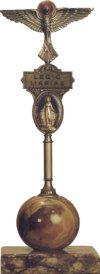
At the Last Supper, on the night He was betrayed, our Savior instituted the Eucharistic sacrifice of his Body and Blood. The Eucharist is the source and summit of the Christian life. The other sacraments, and indeed all ecclesiastical ministries and works of the apostolate, are bound up with the Eucharist and are oriented toward it. For in the blessed Eucharist is contained the whole spiritual good of the Church, namely Christ Himself.
The inexhaustible richness of this sacrament is expressed in the different names like:
The Lord's Supper, because of its connection with the supper which the Lord took with his disciples on the eve of His Passion & because it anticipates the wedding feast of the Lamb in the heavenly Jerusalem.
Breaking of Bread, because Jesus used this rite, part of a Jewish meat when as master of the table He blessed and distributed the bread, above all at the Last Supper.
The Eucharistic assembly, because the Eucharist is celebrated amid the assembly of the faithful, the visible expression of the Church.
The Holy Sacrifice, because it makes present the one sacrifice of Christ the Savior and includes the Church's offering.
The Holy and Divine Liturgy, because the Church's whole liturgy finds its center and most intense expression in the celebration of this Sacrament. In the same sense we also call its celebration the Sacred Mysteries.
Holy Communion, because by this sacrament we unite ourselves to Christ, who makes us sharers in his Body and Blood to form a single body.
Holy Mass, because the liturgy in which the mystery of salvation is accomplished concludes with the missio (sending forth) of the faithful, so that they may fulfill God's will in their daily lives.
The first announcement of the Eucharist divided the disciples, just as the announcement of the Passion scandalized them: "This is a hard saying; who can listen to it?" The Eucharist and the Cross are stumbling blocks. It is the same mystery and it never ceases to be an occasion of division.
"Will you also go away?” The Lord's question echoes through the ages, as a loving invitation to discover that only He has "the words of eternal life" and that to receive in faith the gift of his Eucharist is to receive the Lord Himself.
As early as the second century we have the witness of St. Justin Martyr for the basic lines of the order of the Eucharistic celebration. They have stayed the same until our own day for all the great liturgical families. St. Justin wrote to the pagan emperor Antoninus Pius (138-161) around the year 155, explaining what Christians did:
- On the day we call the day of the sun, all who dwell in the city or country gather in the same place.
- The memoirs of the apostles and the writings of the prophets are read, as much as time permits.
- When the reader has finished, he who presides over those gathered admonishes and challenges them to imitate these beautiful things.
- Then we all rise together and offer prayers for ourselves . . .and for all others, wherever they may be, so that we may be found righteous by our life and actions, and faithful to the commandments, so as to obtain eternal salvation.
- When the prayers are concluded we exchange the kiss.
- Then someone brings bread and a cup of water and wine mixed together to him who presides over the brethren.
- He takes them and offers praise and glory to the Father of the universe, through the name of the Son and of the Holy Spirit and for a considerable time he gives thanks (in Greek: eucharistian) that we have been judged worthy of these gifts.
- When he has concluded the prayers and thanksgivings, all present give voice to an acclamation by saying: 'Amen.'
- When he who presides has given thanks and the people have responded, those whom we call deacons give to those present the "eucharisted" bread, wine and water and take them to those who are absent.
"Take this and eat it, all of you." The Church obliges the faithful to take part in the Divine Liturgy on Sundays and feast days and, prepared by the sacrament of Reconciliation, to receive the Eucharist at least once a year, if possible during the Easter season. But the Church strongly encourages the faithful to receive the holy Eucharist on Sundays and feast days, or more often still, even daily.
The Eastern Churches maintain a lively awareness of the unity of Christian initiation by giving Holy Communion to all the newly baptized and confirmed, even little children, recalling the Lord's words: "Let the children come to me, do not hinder them," and the word of the Council of Trent, which says, “That infants and children not yet come to the use of reason may not only validly but even fruitfully receive the Blessed Eucharist is now the universally received opinion."
The Latin Church reserves admission to Holy Communion to those who have attained the age of reason, as the Council of Trent says, "this sacrament [Eucharist] is [not] necessary for their [those not yet attaining the age of reason] salvation." The exceptions including that in danger of death the Latin infant is to be confirmed and to receive Communion, and that Eastern infants receive Communion, wherever they are in the world, even Latin parishes.
The above article is a short summary of parts of the Catechism of the Catholic Church found at: http://www.vatican.va/archive/catechism/ccc_toc.htm. Due to space limitations, much was not included.